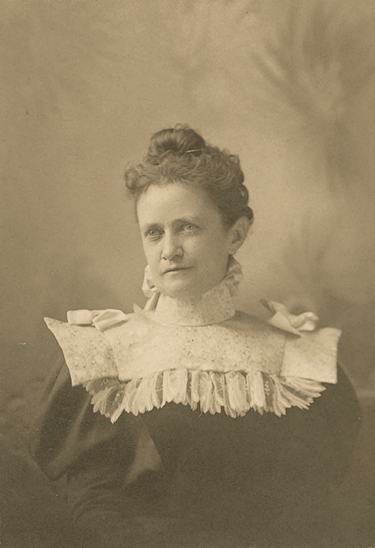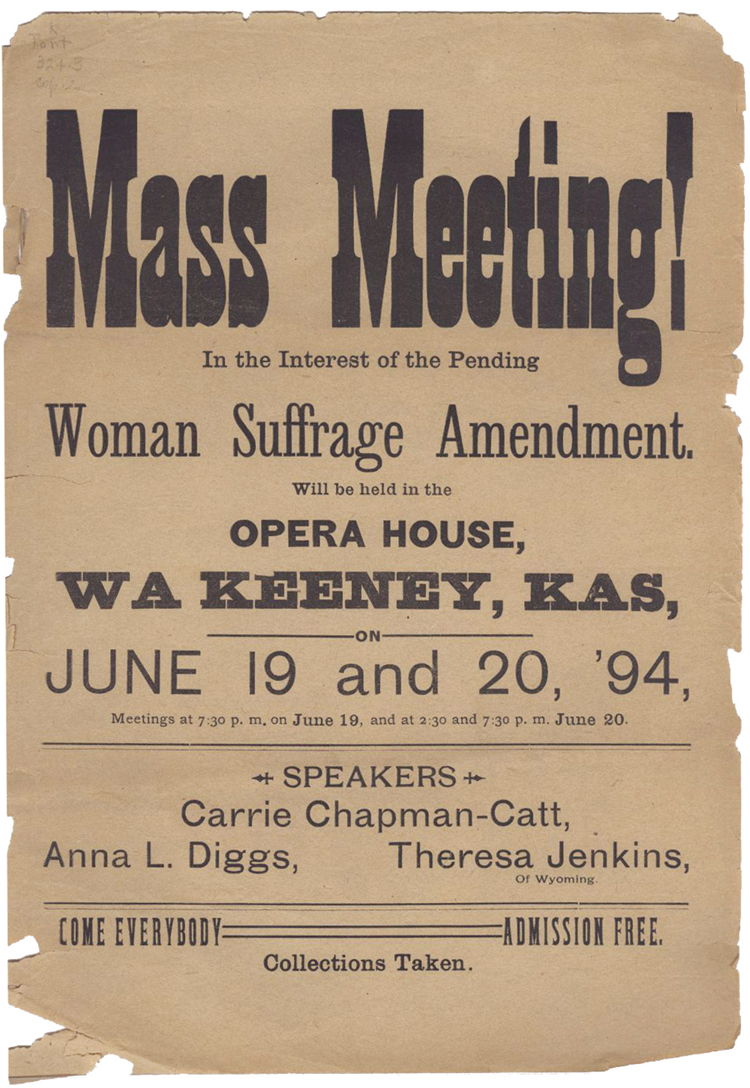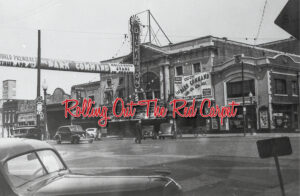Annie Diggs: A Powerful Voice for Reform
| 2017 Q4 | story by Patricia A. Michaelis, Ph.D., Historical Research & Archival Consulting | photos from the Kansas State Historical Society, KansasMemory.org

Annie Diggs
Annie Diggs lived in Lawrence most of her adult life, but she was known throughout the United States as one of the leading speakers for the Alliance and Populist movements. Today, in this era of social media, including Instagram and Twitter, it is difficult to comprehend the importance of the spoken and written word to listeners and readers. Kansans and others were dependent on newspapers and periodicals for news and political opinions, while public speaking added emotion to the ideas expressed in print. This article will focus on the writings of Diggs, one of the most prominent advocates for the “underdogs” of society at the turn of the 19th century.
Annie Le Porte was born in London, Ontario, Canada, on Feb. 22, 1853. Her parents were originally from New Jersey, and the family moved back when she was 2. In 1872, at the age of 19, she moved to Lawrence, Kansas, where she worked in a music store. She married A. D. Diggs in March of the next year. He worked for the post office. The couple had three children. Diggs was a mother and housewife before she decided to raise her voice in support of various reform movements.
She began her public-speaking career on behalf of the temperance movement in 1877, reportedly because of the excessive consumption of alcohol by some University of Kansas male students. She continued to develop her oratory skills while serving a year in the pulpit of the Lawrence Unitarian Church. By the 1880s, Diggs became interested in the Farmers’ Alliance movement, an umbrella term for several grassroots farmers’ organizations active between 1877 and 1892, most prominently in the South and the Plains states. These groups sought to ameliorate debt, poverty and low crop prices by educating and mobilizing rural men and women. They engaged in cooperative economic organizing and asserted their power in electoral politics. This movement evolved into the Populist movement, a third-party movement which sprang up in the 1890s and drew support from disgruntled farmers. Diggs also wrote articles on the populist cause for several newspapers, including the Topeka Commonwealth and the Lawrence Journal, as well as other publications.
Diggs was known as an eloquent speaker and writer. She was described as diminutive and weighing less than 100 pounds, but she made her voice heard in the political movements that originated in the Midwest. She had an impressive vocabulary as her writing shows. Several examples from an article about Carrie Nation published in The New Republic magazine (North Topeka, Kansas) in 1901 illustrate this.
It is not too much to say that Mrs. Carrie Nation is the most conspicuous person in the United States today. The reason for this is two fold; first, the evil stacked is of great magnitude, and next, the method of her attack in unprecedented and spectacular. Added to these is the personality of Mrs. Nation, which is full of surprises and an unclassified as the method she employs.
Were Mrs. Nation just the ordinary crank, zealously pursuing one purpose for cherishing but one idea, the popular interest, in her would quickly wane, but instead each day and hour reveals some unique, picturesque and strong phase of character. Mrs. Nation is utterly uninfluenced by any vulgar desire for notoriety. She does not pose, she is as simple-mannered, unconventional and spontaneous in utterance as a child. … To the outer seeming Mrs. Nation is just a wholesome roly-poly gray-haired grandmother, whose chiefest mission in life would seem to be to vigorously trot her grandbabies, administer catnip tea, recite mother goose rhymes in her soft, southern accent, and chant lullabies with surprisingly sweet musical voice. This is one view of the woman, then presto change she discloses a totally diverse view; she in puritanical unsparing in judgment, . . .[Mrs. Nation] terrorizes jointists, confounds and intimidates officers of the law, creates panic throughout the state and commands the attention of the nation.
It is easy to imagine the power these words might have if spoken aloud. However, the fight for temperance was not her greatest reform passion.

Suffrage Poster 1894
Annie Diggs became one of the best-known speakers in support of the Alliance and Populist movements. An article in The Arena magazine, published in July 1892 in Boston, described the plight of rural women, one of the groups whose cause she espoused.
Farm life for women is a treadmill. The eternal climb must be kept up though the altitude never heightens. For more than a quarter of a century these churning, washing, ironing, baking, darning, sewing, cooking, scrubbing, drudging women whose toilsome, dreary lives were unrelieved by the slight incident or by-play of town life, felt that their treadmills slipped cogs. Climb as they would, they slipped down two steps while they climb one. They were not keeping pace with the women of the towns and cities. The industry [farming], which once led in the march toward independence and prosperity, was steadily falling behind as to remuneration.
She then described how farm women became involved in the Grange and Alliance movements to advocate to improve the prosperity of the lives of farm families. This led to their participation in the political process. In The Arena article, Diggs described the activities of women in various Midwest states but the effort in Kansas as follows:
Kansas, however, furnished by far the largest quota of active, aggressive women, inasmuch as Kansas was the theatre where the initial act of the great labor drama was played. This drama, which, please God, must not grow into tragedy, is fully set on the world stage, and the curtain will never ring down nor the lights be turned off, until there be ushered in the eternal era of justice to the men and women who toil.
The great political victory of the people of Kansas would not have been won without the help of the women of the Alliance. Women who never dreamed of becoming public speakers, grew eloquent in their zeal and fervor. Farmers’ wives and daughters rose earlier and worked later to gain time to cook the picnic dinners, to paint the mottoes on the banners, to practice with the glee clubs, to march in processions. … Narrow ignoramuses long ago stumbled upon the truth, “The home is woman’s sphere.” Ignoramus said, “Woman should cook and gossip, and rock cradle and darn socks”—merely these and nothing more. Whereas the whole truth is, women should watch and work in all things which shape and mold the home, whether “money,” “land” or “transportation.” So now Alliance women look at politics and trace the swift relation to the home—their special sphere.
Diggs believed efforts to preserve the homes of the nation were more important than the prohibition and suffrage causes.
Before this question of the salvation of the imperiled home of the nation, all other questions, whether of “prohibition” or “suffrage,” pale into relative inconsequence. For where shall temperance or high thought of franchise be taught the children, by whose breath the world is saved, if sacred hearth fires shall go out? The overtopping, all-embracing moral question of the age is this for which the Alliance came. Upon such great ethical foundation is the labor movement of today building itself. How could women do otherwise than be in and of it?
Because of her prominence in the Alliance and Populist movements, Diggs was recognized as a national leader. She was elected secretary of the National Citizen Industrial Alliance in 1892. This led to her serving terms as president of the Women’s Alliance, in Washington, D.C., The Kansas Woman’s Free Silver League, the Kansas Equal Suffrage Association and the Kansas Woman’s Press Club.
In 1898, Diggs was appointed Kansas State Librarian and served in that position until 1902. As state librarian, she continued to be concerned about the lives of rural women. She supported the traveling library program that had been stated by the Kansas Federation of Women’s Clubs in 1897. At least 50 book titles requested by the local community, whenever possible, were shipped to the location as part of the “traveling libraries” program. Eventually, 109 such “libraries” were assembled. The Kansas State Board of Agriculture published a speech she made at their 30th-annual meeting, where she described the importance of books to rural youth. “I have been told that one of the greatest objections which young people have to remaining upon the farm is its monotony and the lack of social pleasures and good books. The traveling library fills this last need, and I should think would, in a large degree, cover the lack of social life.”
Diggs spent time in Europe from 1902 through 1904. While there, she was a delegate to the International Co-Operative Congress in England in 1903 and to the Peace Convention in France in 1904. She moved to Detroit, Michigan, where she died on Sept. 7, 1916.
Even though her name is not well-known today, Annie Diggs was a nationally recognized voice for reform in the 1880s, 1890s and early 1900s. As described, she was a proponent of change for the issues of low farm prices, high transportation cost, temperance and prohibition that she believed impacted farm women. With no formal higher education, her eloquence in her speaking and writing reflected her intelligence and passion. With her dedication to the causes of Alliance and Populist movements, she succeeded in making her voice heard in the late-19th and early-20th centuries.




2 Comments
Precio del medicamentos en Ciudad de México Medifive Salon-de-Provence farmaci senza rischi
per la salute
http://plavixclo.com/# buy clopidogrel bisulfate